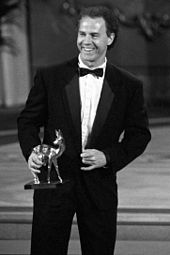Franz Beckenbauer
[8] Beckenbauer led Germany's successful bid to host the 2006 FIFA World Cup and chaired the organizing committee.
[16] Despite his father's cynicism about the game, Beckenbauer started playing football at the age of nine with the youth team of SC Munich '06 in 1954.
[17] Originally a centre-forward, Beckenbauer idolised 1954 FIFA World Cup winner Fritz Walter and supported local side 1860 Munich, then the pre-eminent team in the city, despite their relegation from the top league, the Oberliga Süd, in the 1950s.
Fortune decreed that SC Munich and 1860 would meet in the final and a series of niggles during the match eventually resulted in a physical confrontation between Beckenbauer and the opposing centre-half.
The ill-feeling this engendered had a strong effect upon Beckenbauer and his teammates, who decided to join Bayern's youth side rather than the team they had recently come to blows with.
[18] In 1963, at the age of 18, Beckenbauer was engulfed by controversy when it was revealed that his then girlfriend was pregnant and that he had no intention of marrying her; he was banned from the West Germany national youth team by the DFB and only readmitted after the intervention of the side's coach Dettmar Cramer.
[19] Beckenbauer made his debut with Bayern in a Bundesliga promotion play-off match on the left wing against FC St. Pauli on 6 June 1964.
Libuda was commonly called König von Westfalen ('king of Westphalia'), so the press looked for an even more exalted moniker and invented der Kaiser.
[1] Beckenbauer retired after a two-year spell with Hamburger SV in Germany (1980–82) with the win of the Bundesliga title that year and one final season with the New York Cosmos in 1983.
[1] He made his debut in a World Cup qualification match against Sweden in Stockholm on 26 September 1965, with West Germany winning 2–1.
He was a member of the World Cup squads that finished runners-up in 1966, third place in 1970, and champions in 1974, while also being named to the tournament all-star team in all three editions.
Beckenbauer became the most capped player for the German national team in 1973, he beat Uwe Seeler's record of 72 matches and was overtaken by Lothar Matthäus in 1993.
[1] Still, Beckenbauer was nominated the Best Young Player of the tournament,[29] while also being awarded the Bronze Boot, together with Ferenc Bene, Geoff Hurst and Valeriy Porkujan.
Considered to have revolutionized the role of a sweeper in football, Beckenbauer was not only brilliant at helping out his fellow defenders and goalkeeper in their duties in protecting the goal from the opponents, but was also equally capable of offensive duties, often being the driving force of said attacks, with his passing range and elegant technique allowing him to operate as a playmaker for Bayern Munich and the West Germany national team.
FC Köln playmaker Wolfgang Overath in a two-man midfield for the West Germany national team in the 1966 and 1970 World Cups.
Throughout his career, Beckenbauer stood out for his leadership and fair play, having never received a red card during his time at Bayern.
[36][37] Marseille won the 1990–91 French championship and ended runner-up of the 1990–91 European Cup under the management of his successor, Raymond Goethals.
[41] In June 2014, Beckenbauer was banned by FIFA Ethics Committee for 90 days from any football-related activity for allegedly refusing to cooperate with an inquiry into corruption dealing with the allocation of the 2018 and 2022 World Cups to Russia and Qatar.
[44] In March 2016, the Ethics Committee opened formal proceedings against Beckenbauer regarding the awarding of the 2006 FIFA World Cup to Germany.
[45] In the course of investigations, Swiss officials also found evidence of a payment of at least 1.7 million euro, allegedly from the South African Football Association, to Beckenbauer, via Gibraltar.
[50] In October 2019, Black Mirror Leaks published email correspondence of Russian member of Parliament, Sergey Kapkov, where Beckenbauer and his adviser, Fedor Radmann, were named as recipients of €3 million for their votes in favour of Russia as host of the 2018 World Cup.
[52] He claimed in his memoir that the Bavarian Finance Minister Ludwig Huber, who had attended Beckenbauer's 30th birthday party in 1975, had given him tax advice, including about moving to Switzerland.
[54] During his playing career, Beckenbauer's popularity was such that he was included as a character in Monty Python's sketch "The Philosophers' Football Match" as the sole genuine player and a "surprise inclusion" to the German team.
[55] In a 2013 advertisement for South Korean company Samsung, Beckenbauer appeared as the manager of a Galaxy XI of football players from around the globe, and hands the captain's armband to Lionel Messi.
[57] Beckenbauer was married three times and had five children, one of whom, Stephan, was a professional footballer,[58][59] who died from a brain tumour on 31 July 2015, at the age of 46.
[60] Stephan's son Luca is also a professional footballer, playing for SV Wacker Burghausen in the Regionalliga Bayern.
[67] At the end of his career as a Bundesliga player, Beckenbauer established the foundation Franz-Beckenbauer-Stiftung[68] in Hamburg on 15 May 1982 to support the disabled, the sick and people in need.
Beckenbauer died on 7 January 2024, at the age of 78, due to natural causes as announced by his family in a note sent to Deutsche Presse-Agentur.
[1][2] He is the only defender in football history to win the Ballon d'Or twice,[77] and is often credited as having invented the role of the modern sweeper or libero, a defensive player who intervenes proactively in the offensive game of his team.





